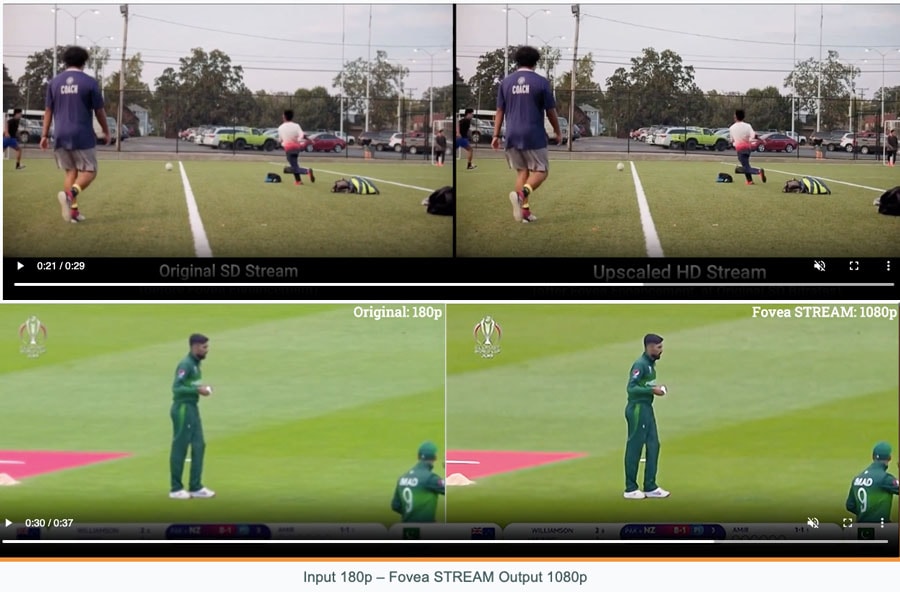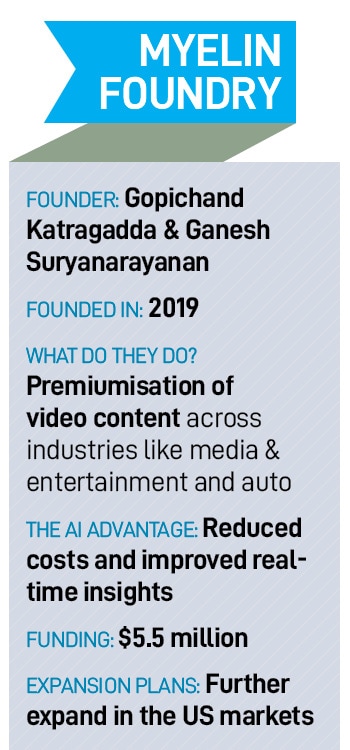Myelin Foundry's Edge AI is transforming user experiences
The four-year-old startup is using cutting-edge AI technology to address issues across industries like media & entertainment and auto


Binge watching is the new way to watch a television (TV) series—be it on a large 4K TV screen or on the smartphone. One can watch old classics on your TV in HD quality or watch live football in full HD, on a smartphone, despite being in a low-network area. Why? Artificial intelligence (AI). As a viewer, one might not realise that this AI layer exists, since the streaming quality is so seamless. Often, this excellent user experience is why users end up preferring a certain OTT platform over another. One of the few players working on this cutting-edge technology is Myelin Foundry.
Gopichand Katragadda was group CTO of the Tata Sons Group and Ganesh Suryanarayanan was in his team. In 2019, the duo stepped down and decided to work on an AI-led company. “We had an inkling that AI was going to be the next big thing," says Katragadda.
Suryanarayanan and Katragadda decided to try and deliver AI on the Edge. Edge AI is a decentralised computational process technology that can execute operations at the very edge of a network—close to where the data is actually created, as opposed to a centralised cloud computing facility. This drastically reduces turnaround times. Reduced latencies translate into more “real" real-time decision-making capabilities for your systems, enhancing performance significantly while saving on resources.
Around 2018-19, the idea of delivering AI via Edge AI seemed impossible, recalls Katragadda. “But in order to do something revolutionary and to develop global-first products from India, it had to be done. So, we went after what was difficult," adds Katragadda, founder and CEO, Myelin Foundry. To add to their challenge of working with Edge AI, Suryanarayanan and Katragadda chose to work with unstructured data. Says Katragadda, "We decided to work with video on Edge—which you can"t put in a spreadsheet— to provide value to our customers." With this in mind, the team zeroed in on certain industries: Media & entertainment, automotive and industrial.
With media & entertainment, for instance, Myelin Foundry found the industry dealing with challenges such as loss of subscribers due to constant buffering issues, delay in loading time, poor quality videos or latency on a regular basis. The solution was: Real-time Edge AI video enhancement.
"The idea was that the platform feeds in the video in standard definition (SD) quality, which is not too high resolution and also saves up bandwidth. Using our AI video enhancement technology—called Fovea STREAM—we will scale up the video on your device, so the output is high definition," explains Katragadda. This results in high quality video output at very low bandwidth. The same technology can be used on content that wasn"t shot in HD or 4K… and scale that up on your device—mobile phone or TV.

For the automotive space, the company"s solution is Fovea AUTO. This includes an AI-enabled, communicative automobile insights through a physical or digital in-car companion and Advanced Driver Assistance Systems (ADAS). "For instance, if a driver is falling asleep or is distracted, a warning is given to the driver. To the fleet company, a message is sent that the driver might need a break," he explains.
 For industrial applications, through their technology Fovea EDGE, the power of AI is used on the shop floor to automate complex visual inspection challenges in real-time. If it’s an aerospace company, Edge AI will help with component inspection for porosity, cracks, weld defects and finish. Similarly, for F&B, it can inspect packaging, assembly verification, fill levels and more.
For industrial applications, through their technology Fovea EDGE, the power of AI is used on the shop floor to automate complex visual inspection challenges in real-time. If it’s an aerospace company, Edge AI will help with component inspection for porosity, cracks, weld defects and finish. Similarly, for F&B, it can inspect packaging, assembly verification, fill levels and more.
Founded in 2019, the research and development took close to three years. They have filed 10 patents of which one has been approved while the others are at various stages. Myelin Foundry has a set charge on a per device, per micro-service basis for its clients. “Micro-service includes voice interactions, providing quality video content, recommending content and more. Currently, 33 percent of our revenue comes from our existing products: STREAM, AUTO and EDGE. The remaining 67 percent is from customised products, as requested by clients," reckons Katragadda. They are hoping to reverse this, and ensure the company makes a majority of its revenue from their existing offerings.
So far, the deeptech startup has received $5.5 million in funding from investors, including Visteon Corporation, Endiya Partners, Beyond Next Ventures and Pratithi Investment Trust. “The demand for services like FOVEA Stream is rising, especially with the increasing spending capacity of the middle class in India and worldwide. The growing number of mobile phone users consuming content necessitates streaming companies to optimise their content delivery network (CDN) costs, making Myelin"s Edge AI solutions highly relevant and timely," says Yuichiro Sano, venture capitalist, Beyond Next Ventures. “Additionally, Myelin"s ambitious vision to address challenges in automotive and other industrial applications has garnered significant validation from customers."
The startup has clocked a turnover of close to $1 million, and is looking at a 2-3x growth in the next few years. A majority of the company’s revenue comes from global companies—close to 80 percent. “Globally, large companies are used to making bets on new technology. We are also working with a few leading Indian clients who are experimenting and driving technology at the forefront," says Katragadda. The challenge with Indian organisations is the mindset. He further emphasises, "While there is a widespread willingness to test the technology, the number of organizations, in India willing to be the lead users of global-first technology is limited."
First Published: Jun 22, 2023, 12:31
Subscribe Now